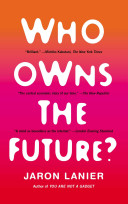What's Good for a Business Can be Bad for Society
Every bit in a computer is a wannabe Maxwell’s Demon, separating the state of “one” from the state of “zero” for a while, at a cost. A computer on a network can also act like a wannabe demon if it tries to sort data from networked people into one or the other side of some imaginary door, while pretending there is no cost or risk involved. For instance, a Siren Server might allow only those who would be cheap to insure through a doorway (to become insured) in order to make a supernaturally ideal, low-risk insurance company. Such a scheme would let high-risk people pass one way, and low-risk ones pass the other way, in order to implement a phony perpetual motion machine out of a human society. However, the uninsured would not cease to exist; rather, they would instead add to the cost of the whole system, which includes the people who run the Siren Server. A short-term illusion of risk reduction would actually lead to increased risk in the longer term.
Notes:
Businesses that refuse to insure high-risk individuals leave the burden of those individuals on the whole community.
Folksonomies: information technology society thermodynamics social responsibility
Taxonomies:
/technology and computing/hardware/computer (0.347774)
/society (0.186990)
/finance/personal finance/insurance (0.160840)
Keywords:
low-risk insurance company (0.943282 (neutral:0.000000)), Siren Server (0.942125 (negative:-0.377266)), phony perpetual motion (0.886609 (neutral:0.000000)), wannabe Maxwell (0.650122 (negative:-0.637539)), wannabe demon (0.645236 (negative:-0.775946)), high-risk individuals (0.642648 (negative:-0.795157)), low-risk ones (0.606292 (neutral:0.000000)), supernaturally ideal (0.582090 (positive:0.373366)), Society Businesses (0.550771 (negative:-0.795157)), high-risk people (0.550495 (neutral:0.000000)), imaginary door (0.545014 (negative:-0.775946)), short-term illusion (0.523688 (neutral:0.000000)), networked people (0.515552 (negative:-0.775946)), longer term (0.495961 (neutral:0.000000)), human society (0.472315 (neutral:0.000000)), risk reduction (0.471452 (neutral:0.000000)), cost (0.328965 (negative:-0.473117)), state (0.237544 (negative:-0.394791)), way (0.224644 (neutral:0.000000)), burden (0.218121 (negative:-0.795157)), doorway (0.208635 (negative:-0.551618)), instance (0.204186 (negative:-0.369234))
Entities:
Society Businesses:Company (0.982414 (negative:-0.795157)), insurance company:FieldTerminology (0.784956 (neutral:0.000000))
Concepts:
Insurance (0.958558): dbpedia | freebase | opencyc
Perpetual motion (0.771642): dbpedia | freebase
Economics (0.704653): dbpedia | freebase | opencyc
Second law of thermodynamics (0.655906): dbpedia | freebase
Business (0.593339): dbpedia | freebase | opencyc
Thought experiment (0.581579): dbpedia | freebase | yago
Entropy (0.578729): dbpedia | freebase
Brownian ratchet (0.573314): dbpedia | freebase | yago





